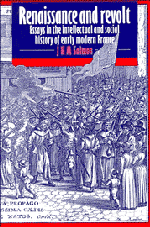Book contents
- Frontmatter
- Contents
- Acknowledgements
- Introduction
- Part I Humanism, stoicism, and interest of state
- 1 Cicero and Tacitus in sixteenth-century France
- 2 Protestant jurists and theologians in early modern France: the family of Cappel
- 3 French satire in the late sixteenth century
- 4 Rohan and interest of state
- Part II Sovereignty, resistance, and Christian obedience
- Part III Structures and fissures
- Index
1 - Cicero and Tacitus in sixteenth-century France
Published online by Cambridge University Press: 23 December 2009
- Frontmatter
- Contents
- Acknowledgements
- Introduction
- Part I Humanism, stoicism, and interest of state
- 1 Cicero and Tacitus in sixteenth-century France
- 2 Protestant jurists and theologians in early modern France: the family of Cappel
- 3 French satire in the late sixteenth century
- 4 Rohan and interest of state
- Part II Sovereignty, resistance, and Christian obedience
- Part III Structures and fissures
- Index
Summary
In early sixteenth-century France Cicero seemed a perfect model to humanists who challenged scholasticism through a rhetoric embodying both philosophy and history. Admiration for Ciceronian style was accompanied by a moralising civic humanism and a respect for Cicero, the philosopher, as the purveyor of Greek wisdom. At the end of the century Tacitus had become a more important linguistic influence, while the ideal of the active citizen and virtuous orator had been replaced by one of Stoic fortitude and withdrawal. Tacitus, the historian of the corruption of liberty, emerged as the exemplar of private and public prudence, and a reinterpreted Cicero was relegated to the role of a minor precursor in prudential morality. This parallel shift in linguistic structures and moral ideologies did not simply result from the stresses of the religious wars in the last third of the century. It was also, in part, a long-term consequence of the earlier importation from Italy of a debate about the extent to which Cicero should be imitated – a debate that attained a new dimension in the context of the Reformation. Other elements that contributed to the demise of Ciceronian humanism were not only the relativist implications in the new historical approach to law but also the logic of Peter Ramus, who, while pleading for the union of eloquence and philosophy, effectively disjoined rhetoric from its component parts. As the neostoic movement developed in reaction to rival religious enthusiasms, the literary models of Tacitus and Seneca invaded Latinity and left their mark upon the vernacular.In the new climate of absolutism Cicero, pater eloquentiae, yielded place to Tacitus, pater prudentiae.
- Type
- Chapter
- Information
- Renaissance and RevoltEssays in the Intellectual and Social History of Early Modern France, pp. 27 - 53Publisher: Cambridge University PressPrint publication year: 1987
- 1
- Cited by



